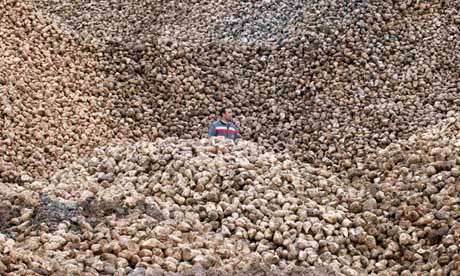
Here's a mini-quiz for foodists who pride themselves on their knowledge of obscure consumables: what are diastatic malt, dextran, ethyl maltol, panocha and sorghum syrup? They are all names used on food labels for added sugar. Robert Lustig, an endocrinologist who works on childhood obesity, is angry with the food industry and the regulatory capture of western governments by its lobbyists. Added sugar is all around us, disguised under deliberately unfamiliar names, and its sweet molecule – fructose – is, according to Lustig, the prime cause of our ballooning "obesity pandemic".
Lustig explains the biochemistry of metabolism, and the vicious cycle of obesity, with patient clarity and some alarmingly vivid imagery. (You know the way sugar helps to brown meat while cooking? It's browning your insides the same way.) He is sceptical about one-shot solutions (miracle diet pills, antioxidants), since there is a complex interdependence between the actions of hormones and food intake. For example: there is fructose in fruit, so why isn't eating fruit bad? Because the fibre in fruit counteracts the noxious effects of the sugar, which is why it's better to eat your fruit than to drink it. (A glass of orange juice contains more sugar than the equivalent volume of Coke.) The bitter pill of Lustig's philosophy is sweetened by an agreeably cute humour: "Naturally occurring fructose comes from sugarcane, fruits, some vegetables, and honey. The first three have way more fibre than fructose, and the last is protected by bees."
There is no shortage of fad food books blaming one or other "toxin" for all our fleshly dolours. Yet to dismiss every such tract as populist scaremongering would be just as irrational as to believe them all. (The "experts" – whom it is fashionable in some quarters always to dismiss wholesale as a compromised class – did not, after all, turn out to be wrong about the harmful effects of cigarettes.) Recent reports elsewhere, indeed, indicate that there is a growing consensus behind the idea that the fructose factor helps to explain what otherwise looks like a puzzle: why do different diets – Atkins, the Paleo diet, the traditional Japanese or Mediterranean diets – all have notable health benefits? Because, or so this thinking runs, they are all low-sugar and high-fibre regimes.
Fat Chance is a persuasively indignant public-policy manifesto, but it's also a self-help book; curiously, each strain flatly contradicts the other. The crux is whether people can actually change their behaviour. Of course they can, you might retort, citing friends who have successfully slimmed; but Lustig spends most of the book denying that this is even possible, the better to justify government regulation. (He suggests agricultural subsidies for green vegetables instead of for corn and soy, and taxing foods that have added sugar. This latter would be a regressive tax, he admits, but the benefits would also accrue mostly to those on low incomes.)
Lustig denies personal autonomy for laudably humane reasons – because he wants to deconstruct the prejudice that obese people have merely given in to "gluttony and sloth". But his insistence on the complete irrelevance of "personal responsibility" leads him to rely on some ropey metaphysics and oversimplified science. "Biochemistry and hormones drive our behaviour," he writes reductively, assuring us that we are merely slaves to the antic nanoreactions of our neurobiology. And because obesity changes our hormonal balance, "weight loss is next to impossible".
Apparently, then, we can't choose what to do. "Most of the world views the word behaviour as meaning the actions we choose to do or not through 'free will,'" he writes. "However, the dictionary definition of behaviour is: 'a stereotyped motor response to a physiological stimulus.'" Unfortunately, Lustig does not provide a footnote to indicate which dictionary he was using. I checked the OED, the New Oxford American Dictionary, and Merriam-Webster, and none gave his definition of "behaviour" as primary. Lustig's description is a more specialised one, recalling the tradition of "behaviourism" in psychology. An animal's actions in this sense could be "conditioned", as in BF Skinner's famous Skinner box: a rat in the box learned to push one button for food and avoid the button that generated electric shocks. There's probably a bracing argument to be made that modern humans all live in a giant Skinner box, but Lustig doesn't come out and make it.
On the other hand, if Lustig's anti-free-will view is correct, it is hard to see the point of his urging the reader, in the book's self-help chapters, to alter his or her own buying and eating habits. Even so, he provides a six-page shopping list of low-fructose and high‑fibre foods that one can find in any supermarket; and offers advice on how to behave in a restaurant. (Don't be in a fast-food joint in the first place; don't have bread with the meal; don't order dessert.) So personal change is possible?
This is not to say that Lustig's advice isn't good. In fact, you can tell it is good because it is so close to what everyone already knows, despite his eagerness to sell the novelty of his version and dismiss the familiar mantra of "eat less and exercise more" as a "myth". So what is his answer? Er, eat less sugar, eat more fibre, and exercise more. Or, if you want it further reduced: avoid "processed" rubbish and just "eat real food". I worried for a moment that much of my own diet would, on Lustig's stringent criteria, turn out to have been unreal food: merely colourful hallucinations of elaborate victuals, simulated scoffing. But then I couldn't help myself, could I?
• Steven Poole's You Aren't What You Eat is published by Union Books.

